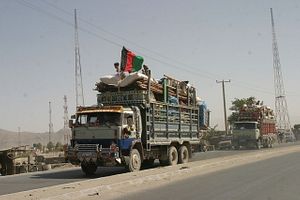Over the last couple years, Pakistan has intensified its efforts to repatriate Afghan refugees. The Pakistani government’s attempts in this regard have surged in the current year with more than 200,000 refugees repatriated this year, half of which occurred in September alone.
After the Soviet Union’s invasion of Afghanistan in 1979, Afghan refugees started to pour into Pakistan. It is estimated that over the last thirty years, about three million Afghan refugees have moved to Pakistan. A large part of the registered Afghan refugees have lived in Khyber Pakhtunkhwa and Baluchistan province and the rest are scattered all across the country.
In 2002, Pakistan signed an agreement with the United Nations High Commissioner for Refugees (UNCHR) and Afghanistan for a voluntary repatriation of Afghan refugees. Since 2002, besides a gradual and voluntary return, Pakistan has never pushed for repatriation of Afghan refugees. Now, however, Pakistan has warned to forcefully expel thousands of Afghan refugee families if they don’t leave voluntarily.
Afghanistan’s ravaged and war torn economy is not equipped to accommodate such a large number of refugees. The horrors of this mass scale repatriation have already overwhelmed Afghanistan’s aid-based economy. Kate O’Rourke, the Norwegian Refugee Council (NRC)’s representative while commenting on the dismal state of returning refugees, said that “These people are falling between the cracks. There’s an urgent need for assistance, or the consequences may be fatal.”
Undoubtedly, the Afghan refugees’ presence in Pakistan has changed the country’s political, economic, social, and security situation to a great extent. However, Pakistan’s current thrust, aimed at sending back Afghan refugees, is not purely driven by the country’s recent counterterrorism efforts; rather, among other things, it’s an effort to build pressure on the Afghan government, which policymakers in Islamabad believe has steadily grown hostile to Pakistan.
Mullah Mansour, the former chief of the Afghan Taliban, who was an Afghan national and also carried a Pakistani passport, was killed in Pakistan a few months ago in a U.S. drone strike. While the government in Afghanistan welcomed the news of Mansour’s death, it blasted Pakistan for continuing its hold-held policy of sheltering Kabul’s enemies. Since Mansour’s death, the hostility has deepened between the neighbors: while Afghanistan’s decision not to participate in the upcoming SAARC summit in Pakistan is being seen in Islamabad as a New Dehli’s ploy to isolate Pakistan, for Kabul, it’s a decision to further strengthen its strategic partnership with India which is built on a shared vision of countering terrorism and extremism in the region.
After Mansour’s death, Pakistan’s much-publicized drive to register and blacklist Afghan refugees who might be involved in some sort of future wrongdoing, in a way, mirrors the country’s previous approach that sought an end to its policy of differentiating between terrorists, which, internationally, has been dismissed as nothing more than rhetoric. The saga of Afghan refugees carrying Pakistan’s National Identity Cards (CNIC) and passports is not new: Since their arrival in Pakistan, thousands of Afghan refugees were systematically allowed to obtain Pakistan’s CNIC, with a majority of them even taking part in the country’s electoral process.
If the leadership in Pakistan considers Afghan refugees a threat to its national security, it should begin its program of forceful expulsions by disbanding the Quetta Shura, the Taliban’s supreme military and political command that carries out the group’s operational planning and is believed to be based in Pakistan.
It’s likely instead that Pakistan will allow a large part of Afghan refugees, including the Taliban leadership, to stay in the country, in a bid to prevent Afghanistan falling under Indian influence. Unless Pakistan changes its policy of intervention in Afghanistan, it’s not likely to repatriate all Afghan refugees for it may complicate its relations with the Pashtun population across the Durand Line, which Pakistan has long used to maintain its influence in Afghanistan.
The rising regional tensions may lead to mass scale expulsions of Afghan families from Pakistan, which will certainly devastate the lives of another young Afghan generation. “I don’t want to go to Afghanistan. I have never been to Afghanistan before. I like Pakistan; Pakistan is my home,” Siraj Khan, an Afghan refugee whose parents migrated to Pakistan in the early 1980s, told The Diplomat.
Pakistan needs to reconsider its policy of large scale expulsions of Afghan refugees for such an approach – not to mention the human cost. Continuing down this path will add more problems to the country’s already intractable diplomatic and security situation.

































